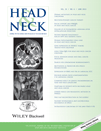Multidisciplinary therapy consisting of minimally invasive resection, irradiation, and intra-arterial infusion of 5-fluorouracil for maxillary sinus carcinomas†
This work was presented in part at the Fourth World Congress of the International Federation of Head and Neck Oncologic Societies, Seoul, Korea, June 15–19, 2010.
Abstract
Background
Current goals for the treatment of maxillary sinus carcinoma include the preservation of vision, eating, communication, and appearance, as well as the achievement of a cure.
Methods
Japanese patients (n = 121) with maxillary sinus carcinoma were analyzed retrospectively. All patients underwent multidisciplinary therapy including minimally invasive resection, 20 Gy irradiation, and intra-arterial infusion of 5-fluorouracil.
Results
The 5- and 10-year overall survival rates were 73% and 68%, respectively. In 97 patients with squamous cell carcinoma (SCC), the 5- and 10-year overall survival rates were 76% and 70%, respectively. All 29 patients with orbital invasion retained the orbital contents, and 21 of these patients demonstrated adequate visual acuity. There were 16 complications, including trismus (5 patients), double vision (5 patients), fistula formation (3 patients), and cataract (3 patients).
Conclusion
A multidisciplinary therapy, consisting of minimally invasive resection, irradiation, and regional chemotherapy, can yield good patient prognosis and quality of life after treatment. © 2012 Wiley Periodicals, Inc. Head Neck, 2012




